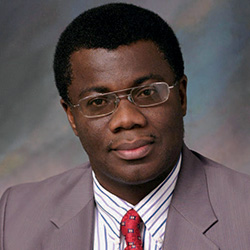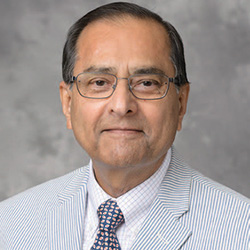Purdue Civil Engineering study influences Indiana infrastructure funding
Research finds that current funding cannot sustain the state's roads
A study completed in 2017 by the Lyles School of Civil Engineering was used by the Indiana General Assembly to realign the highway taxation structure that addressed the growing transportation-funding needs.
The study concluded that the existing (at that time) fuel tax was inadequate to ensure that the state's roadways were maintained properly. According to the report, federal and most state fuel tax rates have not changed for many years. That and the increased fuel efficiency of modern cars has created a serious funding gap that is rapidly growing.
The report authors are Kumares Sinha, the Edgar B. and Hedwig M. Olson Distinguished Professor of Civil Engineering; Samuel Labi, Professor of Civil Engineering; and Bismark Agbelie, post-doctoral researcher in civil engineering. Also providing support was the Joint Transportation Research Program.
"The fuel tax as it was, was not very equitable in terms of maintaining Indiana's roads and bridges," Sinha says. "It needed to be updated to keep up with modern vehicles and mass transportation."
Labi explained that the research was conducted by collecting data from state and federal agencies, such as the Bureau of Motor Vehicles and the Indiana Department of Transportation.
The research team cited three chief reasons that sole reliance on fuel tax revenue (in its pre-2017 form) fell short of maintaining and sustaining America's infrastructure:
- The revenue from tax depends on the amount of fuel consumed. Because the federal formula rewards highway agencies for higher miles of travel in their state, this mechanism does not promote travel reduction or fuel conservation.
- The increasing use of hybrid and electric vehicles makes the concept of fuel tax inconsistent with revenue-generation objectives.
- And although trucks consume more fuel per unit — thus, pay more in fuel taxes — their use results in more wear on roads compared to smaller vehicles. As a result, truck operators contribute relatively less in tax revenue per unit of damage they cause.
After the study was published, House Enrolled Act 1002 was signed in the spring of 2017, receiving a bipartisan vote from the state legislature. To address the issues outlined in the report, the new law aims to generate up to $1.2 billion for state and local roads and bridges, beginning in 2024.
Funding will come from a 10-cent-per-gallon increase on gasoline user fees, an annual $15 fee on all vehicles, an annual $50 fee on hybrid vehicles, and an annual $150 fee on electric vehicles. There also will be special fuel and motor carrier surcharge taxes indexed each year for seven years — capped at one cent per year.
Labi said he believes these updates will greatly benefit Indiana's aging infrastructure. "The previous fuel tax simply was not sustainable," he says. "The overall condition of Indiana's infrastructure is continually deteriorating, and the funding needs to address this matter are increasing. This decision by the state will help bridge the gap to address Indiana’s infrastructure needs."


